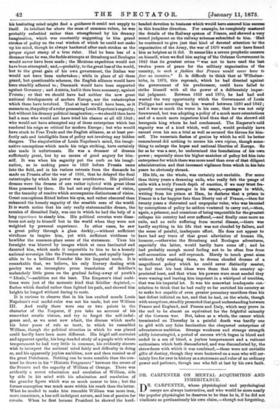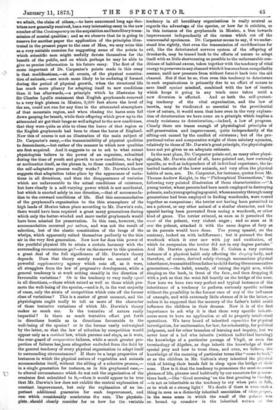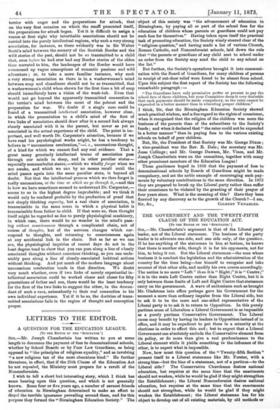DR. CARPENTER ON MENTAL ACQUISITION AND INHERITANCE.
DR. CARPENTER, whose physiological and psychological essays are always instructive, and who would be more nearly the popular physiologist he deserves to be than he is, if he did not vindicate so pertinaciously his own claim,—though not forgetting, we admit, the claim of others,—to have announced long ago doc- trines now generally received, has a very interesting essay in the new number of the Contemporary on the acquisition and hereditary trans- mission of mental qualities ; and as we observe that he is going to reserve for another paper the application of the principles illus- trated in the present paper to the case of Man, we may seize this as a•very suitable occasion for suggesting some of the points to which scientific men might usefully devote themselves for the benefit of the public, and on which perhaps he may be able to give us precise information in his future essay. The first of the more important of Dr. Carpenter's points made in this essay is that modifications,—at all events, of the physical constitu- tion of•animals,—are much• more likely to be enduring if formed. during, the period of physical growth, when. the structural life has much more pliancy for adapting itself to new conditions than, it has afterwards,—a principle which he illustrates by Sir Charles Lyell's statement that English greyhounds removed to a very high plateau in Mexico, 9,000 feet above the level of the sea, could not run for any time in the attenuated atmosphere of that mountain region, and when chasing the hares soon fell down gasping for breath, while their offspring which grew up in the attenuated air got their lungs so well adapted to the new conditions, that they were quite as able to chase the hares of that region as the English greyhounds had been to chase the hares of England. Now this of course is not an illustration of the main subject of Dr. Carpenter's essay,—the transmissibility of physical qualities to descendants,—but rather of the manner in which new qualities are first acquired. And it suggests to us to ask to what extent physiologists believe in the power of an organism, submitted during the time-of youth and growth to new conditions, to adapt or acclimatise itself, as the phrase is, to those conditions, and how the self-adaptative process really works ? Mr. Darwin's theory suggests that adaptation takes place by the appearance of varia- tions in all directions, and then the disappearance of varieties which- are unfavourable to the actual conditions of existence, but here clearly is a self-varying power which is not accidental, but which is exerted solely in one direction,—that of accommoda- tion to the outward conditions of life. Had this accommodation of the greyhound's organisation to the thin atmosphere of the high lands of Mexico taken place according to Mr. Darwin's rule, there would have been required a great many generations during which only the.better-winded and more useful greyhounds would have been selected for preservation. In this case, however, the accommodation occurred per saltum, and was not the result of selection, but of the elastic constitution of the lungs of the whelps, which apparently suited themselves perfectly to the thin air in the very first generation. Now how far does this power of the youthful physical life to attain a certain harmony with the surrounding circumstances go ?—for on the answer to this question a great deal of the full significance of Mr. Darwin's theory depends. Does that theory merely render an account of a powerful supplementary agency which cuts off, as it were, all stragglers from the law of progressive development, while a general tendency is at work setting steadily in the direction of favourable variations? Or is the tendency to vary really equal in all directions,—those which retard as well as those which pro- mote the well-being of the species,—and is it, in the vast majority of cases, only the strain of competition which cuts off the former class of variations? This is a matter of great moment, and the physiologists ought really to tell us more of the character of those tentative variations of which Mr. Darwin's theory makes so much use. Is the tentative of nature really impartial ? Is there as much tentative effort put forth in directions hostile as in directions favourable to the well-being of the species? or is the former vastly outweighed by the latter, so that the law of selection by competition would appear only as a residual law, which pursues and slays, as it were, the rear-guard of comparative failures, while a much greater pro- portion of failures hankbeen altogether excluded from the field by the general tendency of every physical organisation to adapt itself to surrounding circumstances? If there be a large proportion of instances in which the physical nature of vegetables and animals accommodates itself, without the sifting of a selective process,— in a single generation for instance, as in this greyhound case,— to altered circumstances which do not suit the organisation of the creatures first submitted to it,—then it would appear to be true that Mr. Darwin's law does not exhibit the central explanation of constant improvement, but only the explanation of an im- portant additional guarantee for such improvement, and one which considerably accelerates the rate. The physiolo- gists, should clearly consider for us how far the variable tendency in all hereditary organisations is really neutral as regards the advantage of the species, or how far it exhibits, as in this instance of the greyhounds in Mexico, a bias towards improvement independently of the causes which cut off the unsuccessful specimens.. Dr. Carpenter- seems to say, if we under- stand him rightly, that even the transmission of modifications for evil, like the deteriorated nervous system of the offspring of drunkards, may be traced back to the efforts of nature to adapt itself with as little shortcoming as possible to the unfavourable con- ditions of habitual excess, taken together with the tendency of vital energy to persevere in any channel which it has oncebeen compelled to assume, until new pressure from without force it back into the old channel. But if that be so, then even this tendency to deteriorate in such organisations is primarily due to an effort of nature to save itself against mischief, combined with the law of inertia which keeps it going in any track once taken until a new diversion is effected. And as both the self-protect- ing tendency of the vital organisation, and the law of inertia, may be vindicated as essential to the providential view of nature, it would seem that here even in the very explana- tion of deterioration we have come on a principle which implies a steady resistance to deterioration,—indeed, a law of progress. Clearly there are traces enough of physiological principles of self-preservation and improvement, quite independently, of the sifting-out caused by the conflict of existence ; but of the pro- portional value and comparative weight of these salutary agencies, relatively to those of Mr. Darwin's great principle, the physiologists. have not yet given us an adequate estimate.
In the next place, Dr. Carpenter points out, as many other physi- ologists, Mr. Darwin chief of all, have pointed out, how curiously specific, as well as independent of all individual experience, the in- herited instincts of the lower animals, and very often the physical habits of men, are. Dr. Carpenter, for instance, quotes from Mr. Thomas Andrew Knight, in the "Philosophical Transactions," the following very pointed illustration of these characteristics:—"A young terrier, whose parents had been much employed in destroying polecats, anda young springing spaniel, whose ancestry through many generations had been employed in finding woodcocks, were reared together as companions ; the terrier not having been permitted to see a polecat, or any other animal of a similar character, and the spaniel having been prevented from seeing a woodcock, or other kind of game. The terrier evinced, as soon as it perceived the scent of the polecat, very violent anger ; and as soon as it saw the polecat, attacked it with the same degree of fury as as its parents would have done. The young spaniel, on the contrary, looked on with indifference ; but it pursued the first woodcock which it ever saw with joy and exultation, of which its companion the terrier did not in any degree partake." And Mr. Darwin quotes from Mr. F. Galton a very curious instance of a physical habit only affecting the sleeping body, and therefore, of course, derived solely through unconscious physical inheritance, transmitted from father to child during three consecutive generations,—the habit, namely, of raising the right arm, while sleeping on the back, in front of the face, and then dropping it with a jerk so that the wrist fell heavily on the bridge of the nose. Now here we have two very perfect and typical instances of the inheritance of a tendency to perform curiously specific actions without the possibility in the former case of any of the influence of example, and with extremely little chance of it in the latter,— unless it be supposed that the memory of the father's habit could influence the children in their dreams. Now it is of the first importance to ask why it is that these very specific inherit- ances seem to have no application at all to properly intellectual operations. We have heard of inherited capacities for physical investigation, for mathematics, for law, for scholarship, for political judgment, and for other branches of learning and, inquiry, but we never hear of a lad who inherits (without individual learning) the knowledge of a particular passage of Virgil, or even the terminology of Algebra, as dogs inherit the knowledge of their special prey and how to treat them, and even, we believe, the knowledge of the meaning of particular terms like " come to heel," or as the children in Mr. Gallon's story inherited the physical trick of letting their hands fall in sleep upon the bridge of their nose. How is it that the tendency to pronounce the most common phrases of life, phrases used habitually by our ancestors for ge.uera- tions back,—like' Good morning 'on the first greeting in t
—is not as inheritable as the tendency to cry when pain is felt, or to wink at a strong light ? We doubt if there is even such a thing in man as a distinctly inherited association of ideas proper, in the same. sense in. which the smell of the pulec it was so bound up somehow in the inherited nature of the
terrier with anger and the preparations for attack, that on the very first occasion on which the smell presented itself, the preparations for attack began. Yet it is difficult to assign a reason at first sight why inheritable associations should not be carried into the purely intellectual regions, why such a very strong association, for instance, as there evidently was in Sir Walter Scott's mind between the scenery of the Scottish Border and the wild stories of the past, should not be so transmitted to a child that, even before he had ever had any Border stories of the olden time narrated to him, the landscapes of the Border would have summoned up vague conceptions of romantic passions and wild adventure ; or, to take a more familiar instance, why such a very strong association as there is in a washerwoman's mind between soap and cleanliness should not be so transmitted, that a washerwoman's child when shown for the first time a bit of soap should immediately have a vision of the wash-tub. Even that would not go beyond the apparently transmitted connection in the terrier's mind between the scent of the polecat and the preparation for war. We doubt if a single case could be found of a transmitted intellectual association, however close, in which the presentation to a child's mind of the first of two links of association should draw after it a second link always closely associated with it in the parent, but never as yet so associated in the actual experience of the child. The point is im- portant, and well worth Dr. Carpenter's attention, because if we have read his psychological works aright, he has a tendency to believe in " unconscious cerebration,"—i. e., unconscious thought, of a kind for which we cannot find any real evidence. That a great many genuinely intellectual trains of association pass through our minds in sleep, and in other peculiar states— especially somnambulist states,—which we wholly forget when we are awake, and which we can by no means recall until the mind passes again into the same peculiar state, is beyond all doubt. But that the intellectual process which we thus forget is really unconscious, at the time at which we go through it,—and this is how we have sometimes seemed to understand Dr. Carpenter,— seems to us in the highest degree improbable ; and we think it would only be rendered probable by the production of proof that not simply thinking capacity, but a real chain of association, is transmissible in the same sense in which a physical habit is transmissible from father to child. If that were so, then thought itself might be regarded as due to purely physiological machinery, in which case, there would be no wonder in the mind's pass- ing without consciousness through a complicated chain, not of coarse of thoughts, but of the nervous changes which cor- respond to thoughts, and returning to consciousness again at any accidental link in the chain. But as far as we can see, the physiological inquiries of recent days do not in the least degree tend to show that you can pass along a line of closely associated thoughts without conscious thinking, as you can unde- niably pass along a line of closely-associated habitual actions without thinking. And yet much of the modern language about unconscious cerebration tends in that direction. We doubt very much whether, even if two links of merely experiential in- tellectual association could be worked closer and closer for fifty generations of father and son, there would be the least tendency for the first of the two links to suggest the other, in the descen- dant of such a race, antecedently to their real connection in his own individual experience. Yet if it be so, the doctrine of trans- mitted associations fails in the region of thought and conception proper.




































 Previous page
Previous page